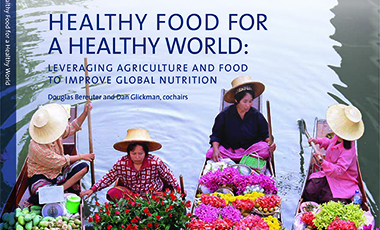Eat your vegetables. Wash your hands. Go to school. These simple instructions, which many of us hear repeatedly throughout childhood, are the basic building blocks of growing up healthy and prepared to reach one’s full potential. However, as Roger Thurow—a senior fellow at the Chicago Council on Global Affairs who spoke at the Council’s food security symposium last week—explained, for millions of children around the world, it is not that simple.
Because they lack access to affordable, nutritious food, one in four children in the world is stunted—that is, so malnourished that they will never grow to their full potential height and may suffer from permanent cognitive damage.
The number of stunted children in the world is equivalent to every child in the United States, multiplied by 10. Nearly half of all child deaths have malnutrition as an underlying cause.
At the same time, obesity also is on the rise: by one measure, half of the world will be overweight by 2050.
This double tipping point requires a new approach to food security—one that ensures not just sufficient quantity of food for the world but also quality. The symposium’s diverse panelists and presenters—from a local farmer to corporate leaders and medical experts, as well as present and former US policymakers—offered some powerful calls to action:
- Change the food system. By 2050, 60 to 70 percent of the world’s population is projected to be living in urban centers—posing a huge challenge to food security. However, this also offers a good opportunity to change food systems. Rethinking how we produce and distribute food is absolutely critical, Global Alliance for Improved Nutrition (GAIN) Executive Director Marc Van Ameringen, said, in order to avoid a scenario involving billions of people in slums eating cheap, processed food. He pointed out innovative ideas such as Shanghai’s commitment to building farms close to the city, and new technologies such as multi-story hydroponic vegetable farms.
- Work together across sectors. “People don’t get food from governments, they get it from the markets,” Van Ameringen pointed out. The private sector must join forces with governments, development programs, research institutions, civil society and others in the effort to make nutritious food available to those who need it at a more affordable cost.
Lindiwe Sibanda, CEO of the Food, Agriculture, and Natural Resource Policy Analysis Network (FANRPAN) agreed, explaining how her grandmother’s one-acre farm switched from low-yielding but diverse and nutritious “orphan” crops such as pigeon pea to maize. “We need the private sector to invest in orphan crops,” she said. “If there was a good market for orphan crops, they’d still be planting them on my grandma’s plot.” - Calculate the true cost of food. The price of food does not take into account the high costs of food waste or the use of natural resources such as water. “Mother Nature’s back office is not set up for billing,” Sunny Verghese, CEO of Olam International, said. “We have to do it.” Verghese also pointed out that there is no charge for water in many of the most water-scarce countries, noting that when water is free, farmers have no incentive to squeeze the most production out of every drop.
Our current levels of food waste—one-third of all food produced is lost—also waste money, inputs, incomes, and health. “This is the unfinished business of the green revolution,” the Rockefeller Foundation’s C.D. Glin said. - Use all the options that work. Science and technologies are critical to sustainably and nutritiously feed the world’s population, from improved seeds to processing methods that keep perishable fruits and vegetables from spoiling before they can be eaten.
Maryland farmer Jennie Schmidt recommended her synergistic philosophy of using the most effective and sustainable methods from all types of farming: organic, conventional, and high technology–as long as they help cultivate the richest and most sustainable soil possible.
Cargill Executive Chairman Gregory Page asked attendees to help improve the public’s comfort with science. “We need to share the environmental and economic benefits of science in our food systems,” he said. - Educate, and start early. All the affordable, accessible healthy food in the world won’t make a difference if people don’t eat it. Education and behavior change communication campaigns are critical – especially targeting mothers and mothers-to-be in the first 1000 days of a child’s life, from conception to age two.
- Measure. Shawn Baker, nutrition director at the Bill and Melinda Gates Foundation, called data the common language between the often-separated sectors working in food and nutrition security. Measuring consumption data is also the only way to find out if the education and behavior change campaigns designed to get people to eat healthy foods are really working.
According to the Chicago Council’s Douglas Bereuter, the US should take the lead on improving data by renewing its investments in research institutions and universities abroad.
In his closing address, US Secretary of Agriculture Tom Vilsack invoked yet another familiar childhood lesson: share. That is ultimately what the US is doing in its food aid programs, he explained: sharing food, resources, knowledge, and—through fellowships—sharing people.
The insights shared at this food security symposium will surely go a long way towards getting nutritious food closer to the millions of children and adults who desperately need it.







